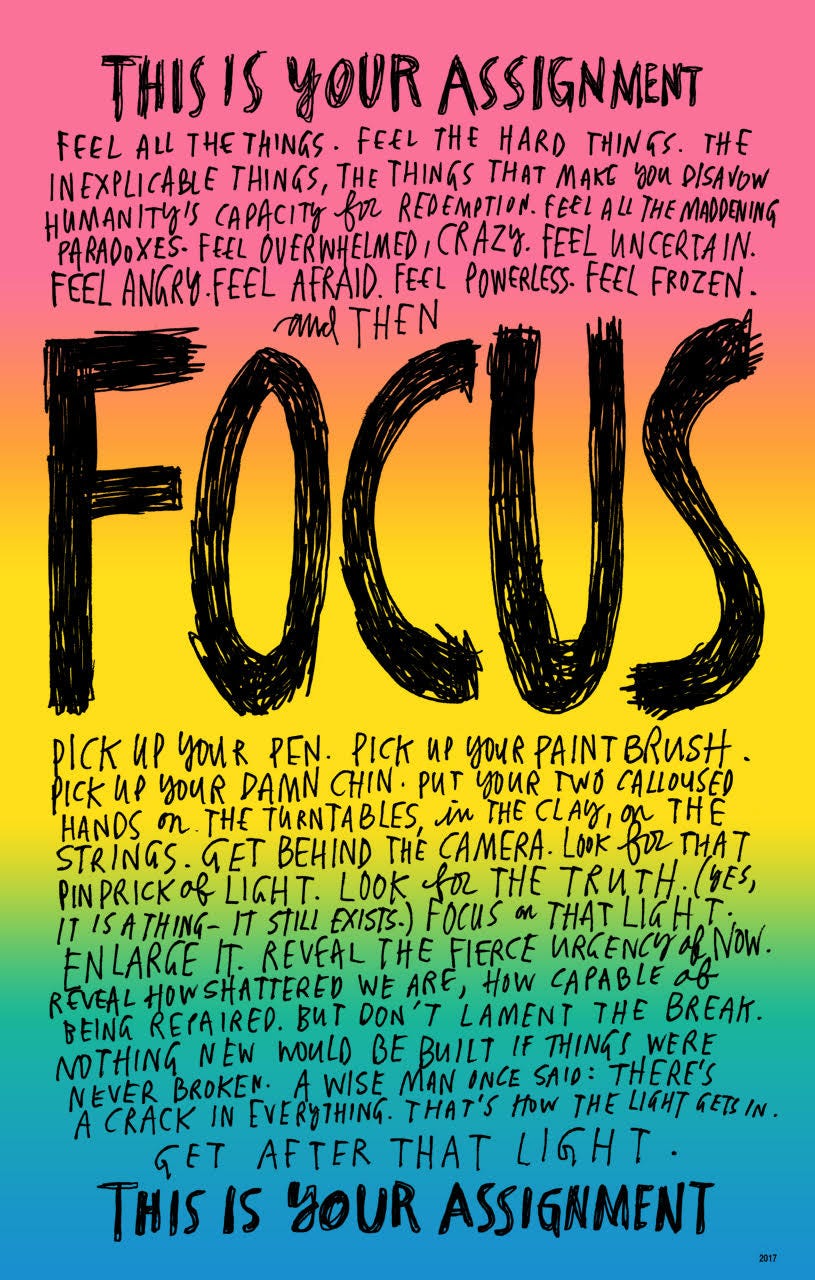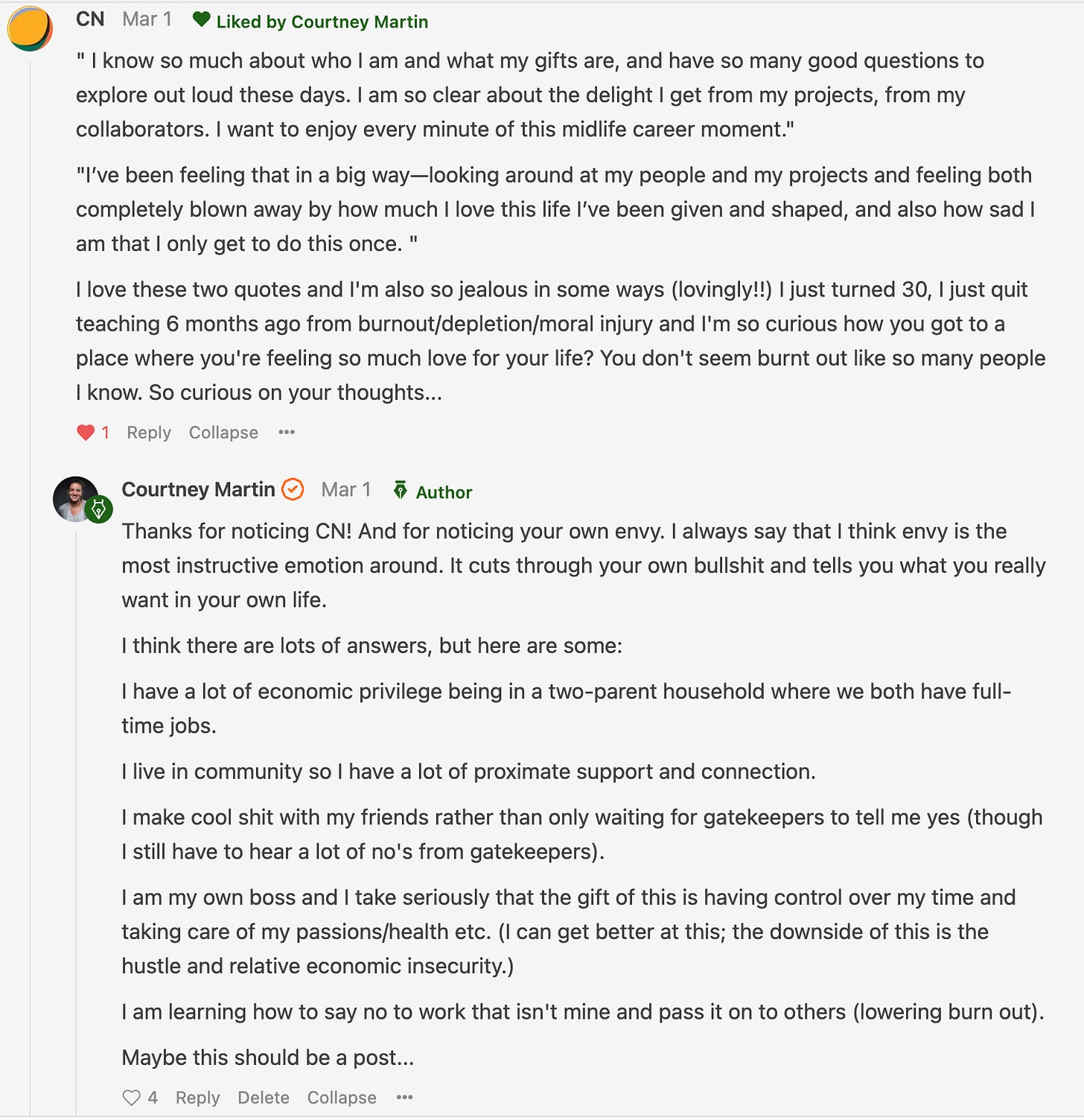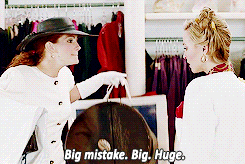A couple of weeks ago this conversation popped up in the comments of a newsletter, and I wanted to honor CN’s vulnerable sharing and earnest question.
So here you go, CN, and any others who need some thoughts like this right now:
Make usefulness your Northstar.
I love being useful. Whether that’s in mundane ways, like being the person to send the email that keeps a project moving forward, or more shiny, like facilitating a conversation between two brilliant people. Of course the shiny stuff feels great, and I need little hits of it to keep me going, but the mundane stuff still feels good, too. And I did TONS of the mundane stuff in my 20s and even 30s in order to ingratiate myself to brilliant, visionary people that I wanted to learn from. There’s no shame in that. If you’re young, be enthusiastic and accountable, and the rest will follow.
Play your totally unique two notes.
Editor Jamia Wilson, a longtime friend and collaborator, recently said of one of her author’s: “She plays two notes and you know it’s her.” (No surprise that her partner is a jazz musician.) I loved that and it reminded me of one of the things I have never stopped asking myself as I navigate my work life: “What is my totally unique contribution here?”
I would prefer to spend as much time as I can doing the thing(s) that only I can do. The other stuff is someone else’s totally unique contribution so who am I to step on their toes?
This might seem to contradict usefulness, but I think of them as dual strategies. Sometimes I’m just being useful (picking up the pizza, making the doodle poll, sending the link), but sometimes I’m playing my two notes. I’m not above or below either role. Sometimes they overlap. Sometimes they don’t. Stay humble. Stay magical.
Let your body be your guide.
I’ve realized that sometimes there is a disconnect between my idea or story about a job or a collaborator and the way they actually make me feel. I’ve learned to pause, tune in, and notice: “Wow, I really don’t want to be doing this right now. I am feeling huge resistance in my body about this gig.”
Or in contrast, “Wow, I am flying high after that meeting even though I thought it was going to be a drag.”
You don’t always have the economic margin to honor those feelings—i.e. sometimes the thing that pays the bills doesn’t leave your body singing. But at least you can be fully aware of the choices you’re making and why you need to make them, for a season. You can always work your way out of jobs that deaden your spirit eventually.
Pay attention to your jealousy.
When you are jealous of someone else’s success, praise be! That’s unfiltered information about something you desire for your own life. Instead of shaming yourself or hating on them, ask yourself, “What is the thing I want that’s registering as envy in this moment and how can I go out and get it?”
Then you can transform the yucky lingering acidity of jealousy into the shining abundant energy of “mudita”—a Sanskrit word for “sympathetic or vicarious joy.”
Make the thing before anyone says yes.
Don’t wait for someone to tell you that your project is worthwhile. If you’re moved to write, draw, create, produce something, that’s all the permission you need to devote some time and energy to it. Make a commitment to yourself. Some of my most rewarding collaborations over the many decades have been totally homegrown, grassroots situations (like the Secret Society for Creative Philanthropy) that ended up reaching really wide audiences because—in part—they were unfettered by “too many cooks in the kitchen” bullshit or the bad advice of supposed experts.

Don’t make anything alone.
Speaking of collaboration, give yourself the gift of the solidarity and feedback that community provides—whether it’s a writing group, an accountability crew, or an artist collective. You need people who can cheer for you when things go well, re-enact the Pretty Woman scene by your side when things don’t go well, and give you practical advice all along the way. You need people to normalize how up-and-down a real life is, so you don’t fall for the linear, perfect mythology on social media. You need people who love you unconditionally whether you’re crushing it or getting crushed. I’ve had those people, always, so many of them, and they’ve made me who I am. Any success I have is a direct result of the creative communities I’ve been a part of.
Define your own metrics of success.
You can tie yourself up into some pretty terrible knots if you pursue other people’s ideas about what counts as a success. I have some general ideas of what success means to me, but I also very intentionally think about what success is for me on individual projects. It’s not just about rejecting bullshit standards, but also a process that helps me stay relational, grateful, and value-centered as I keep making things to put out into the world. And, while this might sound a little sad, I find that I consistently have what other people might see as very small metrics.
For example: If one person reads the book and feels like it helped them ask better, more broad, justice-oriented questions about the school enrollment process, that will be a win. As you might imagine, way more than one person has let me know that Learning in Public did this for them, but it felt great to hear that for the first time and be able to scream “Success!” in my head instead of staring despondently at the NYT Bestseller list. And every new time I hear it, it’s icing on the cake.
Gamify your no’s.
If you are a person who says yes too often, give yourself a dopamine hit when you say no. You can add them up and treat yourself to something at the end of a week or month. Or just find a friend who knows you are working on this and text them so they will celebrate you with an enthusiastic emoji.
As a freelancer, I find it helpful to map out my projects at least six months in advance. I am really clear, at 43, that I have limited time and that I don’t like feeling busy and overwhelmed. For this reason, sometimes I institute a blanket NO season, which means that unless something is just so good there is NO WAY I CAN SAY NO, I’m defaulting to a kind no (and always thinking about who else I might recommend for the gig). Other times, I’m more open, and I try to really honor my very first bodily feeling when I heard about the thing. What does my spidey sense tell me on first blush? That’s gold.
Collectivize in the “tragic gap.”
As anyone knows me already knows, I’m obsessed with the concept articulated by my mentor and friend, Parker Palmer, of the “tragic gap.” Here he is on it:
“The insight at the heart of nonviolence is that we live in a tragic gap -- a gap between the way things are and the way we know they might be. It is a gap that never has been and never will be closed. If we want to live nonviolent lives, we must learn to stand in the tragic gap, faithfully holding the tension between reality and possibility.”
I think burn out is completely understandable within the context of so many of our country’s most broken systems and cultures. If you’re burning out, it probably means you’re actually staying open and paying attention…which is noble, but hazardous in these kinds of situations. I don’t think being mindful of the tragic gap can prevent you from burning out, but it may alleviate a lot of pain to acknowledge a) that you’re not alone in your frustration with the status quo and b) that you, alone, cannot fix it.
Anytime I’ve rubbed up against personal disillusionment, I have joined hands and it’s never done me wrong. When “third wave” online feminists and I realized that our burn out was collective, not just individual, we organized a gathering to try to figure out alternative business models and ways to collectivize. Ten years ago now, my mentors and colleagues David Bornstein, Tina Rosenberg, and I created the Solutions Journalism Network because we all had an instinct that journalists needed cultural permission and retraining to pursue compelling, rigorous reporting on solutions (just as they did problems). When my bestie and my husband and I got sick of seeing all White/male panels and our BIPOC friends get treated badly when they were invited, we created FRESH.
In my book, Do It Anyway: The New Generation of Activists, I ended up writing a lot about how the activists I reported on managed, not necessary to transform or even fix existing systems, but at least re-humanize them. At the end of the day, that’s a big deal, too.
My work touches a lot of systems and fields that I am deeply frustrated by—the education system, the care system, journalism, philanthropy, “thought leadership” etc. I try to hold my pain over the seemingly intractable brokenness of these spaces, while also knowing that I can re-humanize them if I always join forces, steadfastly apply my unique gifts, my talent for connecting and celebrating people, and my growing capacity to have hard conversations about power and inequity.
Some days are more depleting than others. Some days I am so disappointed in people. But other days, I feel the sum total energy of so many good people offering up their gifts to nudge us towards more aliveness, awakeness, and justice, and that keeps me going.
Okay your turn to add the tenth thought on building a life you love! What is missing?







I think the only addition I would make is that the only timeline that matters is your own. As long as you are learning and growing, curious about life and able to regularly access joy, and feeling creatively engaged it doesn't actually matter if what gets you there is something you have been working on steadily since you were relatively young or if you just discovered you loved it in your 40s, 50s, or 60s. Or older! Decided you really want to write a book at 50 and feel like you're behind all the young folks who have wanted to write since they were in kindergarten? Don't worry about it. Just write the damn book the way you can now that you're old enough to have accrued experience and wisdom. Want to sing or take on a new career or learn to scuba dive? Good! Do. It.
We have a very standard, BORING story in our culture about how to achieve and when to achieve, when certain milestones are supposed to occur, and woe be to anyone who doesn't achieve them on time in the proper order. This is a stupid lie. Adulthood is way more winding and surprising, full of stops and starts and unexpected left turns and U-turns and being spun around so many times you're dizzy then the storytellers want us to know. We lose things and people and sometimes a sense of clear purpose (assuming we ever had one.) only to acquire new loves and stuff and vocations. We stumble upon things, get unforeseen opportunities, develop strengths we never knew we would need which change us irrevocably. Your story is yours. Your journey is yours. Do things in your own time, according to your own instincts. You'll always be right on time.
Treat joy as a wild creature, not a domestic one. Our farm nests many species, but I am as proud of the fluid boundary around it that invites wild ones to visit and re-visit too -- foxes, ravens, porcupines, wild turkeys, nesting sandhill cranes, even moose and bears sometimes. Every time they come is magic. I can't force or keep them here. But I can get really curious about their experience in this ecosystem I have an impact on. Do they feel safe enough? Curious? Attracted? Even connecting, sometimes? What am I doing persistently that makes them think, "Not now, maybe I'll try again another time."? Is there threat or toxicity, or barrenness somewhere I can look at, play with?
And I am also such an ecosystem. I can (and do) make myself into a biologist of joy. I learn that it is wary of habits of drama, pride, entitlement, blame, and withholding. It's tempted closer by humility, candor, frolic, surrender, generosity, self-honesty... It won't be summoned, can't be force-grown, can't be locked up. But we can cultivate the garden that we are, and then let some of our fences fall, and then stand again frozen in early morning light, meeting its clear eyes until it's ready to move onward.